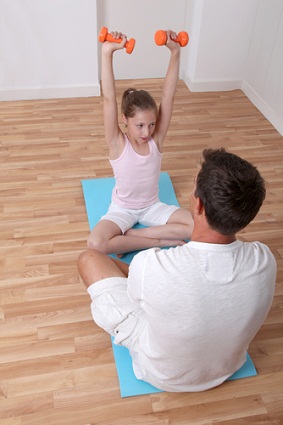Strength Training For Young Athletes Builds More Than Just Muscles
By Dan Peterson, TeamSnap's Sports Science Expert
While cardio and technical training has always been part of youth sports, parents and coaches have been a little unsure about the role of strength training for athletes under the age of 18. How early? How much? Which exercises? Now, new research is helping give us the answers to these questions, and the news is encouraging. According to exercise scientists at the University of Michigan, young athletes who add strength training to their workout routines can up their games and their long-term health.
The same health benefits of a stronger adult body apply even earlier to kids. “The stronger you are relative to your body mass, the healthier you are,” said Mark D. Peterson, Ph.D, M.S., research assistant professor in the Department of Physical Medicine and Rehabilitation at the University of Michigan Medical School. “Exercise, sports, and even recreational activity that supports early muscular strength acquisition should complement traditional weight loss interventions among children and teens in order to reduce risks of serious diseases throughout adolescence.”
 Dr. Peterson, along with Professor Paul Gordon of Baylor University, analyzed the health data from 1,400 kids, ages 10-12, that took part in the Cardiovascular Health Intervention Program (CHIP). The program included sixth graders from 17 Michigan schools between 2005 and 2008.
Dr. Peterson, along with Professor Paul Gordon of Baylor University, analyzed the health data from 1,400 kids, ages 10-12, that took part in the Cardiovascular Health Intervention Program (CHIP). The program included sixth graders from 17 Michigan schools between 2005 and 2008.
They compared each kid’s performance on a standardized hand-grip strength test with other health data, including body fat percentage, glucose level, blood pressure, cholesterol levels, and triglycerides.
Kids who had a higher strength to body weight ratio also had significantly lower risks of heart disease and diabetes. The research is published in the March issue of Pediatrics.
Even with these health benefits, parents need to have some guidelines on how to start a strength program. The Mayo Clinic advises that as early as age 7 or 8, children can start muscle-building exercises as long as they can follow directions from an adult supervisor. They provide these reminders:
 Seek instruction: Use a trained strength and conditioning coach who can recommend an appropriate program.
Seek instruction: Use a trained strength and conditioning coach who can recommend an appropriate program.
Warm up and cool down: Always start and end a workout with light aerobics and stretching.
Keep it light: If weights are available, just a single set of 12-15 repetitions can get the job done. Body weight exercises like push-ups will also create results.
Stress proper technique: Work with a coach or an experienced adult, and emphasize form over weight. Learning the right technique early is key to avoiding injuries.
Supervise: Always have an adult present to help.
Rest between workouts: 2-3 strength workouts per week is plenty. Be sure to get a full day in between workouts of a specific muscle group.
Keep it fun: If it’s not fun, kids won’t do it!
If done right, strength training can help a young athlete get in shape and build a healthy lifestyle. “It’s a widely-held belief that BMI, sedentary behaviors, and low cardiovascular fitness levels are linked to diabetes, heart disease, and stroke, but our findings suggest muscle strength possibly may play an equally important role in cardiometabolic health in children,” concluded Dr. Peterson.
NEW! Free Sports Organization Resources
All of TeamSnap's ebooks, articles, and stories in one place. Access Now
Similar Articles:
Study Finds Unhealthy Air Quality In Gyms
By Dan Peterson, TeamSnap's Sports Science Expert …
Read More

Just a Short Workout Can Reap Health Benefits
By Dan Peterson, TeamSnap's Sports Science Expert …
Read More

How Shivering In the Cold Burns Fat
By Dan Peterson, TeamSnap's Sports Science Expert. Stuck…
Read More
